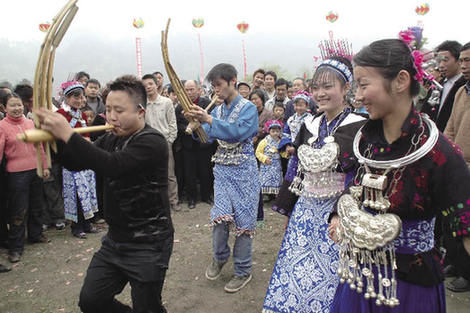| It's Only Because I Love You
– Ethnic Valentine's Customs
The Chinese have long ago found strange and interesting ways to express love on their own traditional Valentine equivalents.
 |
| Young people of the Miao ethnic group celebrate the "Double-Third" Festival. |
The Zhuang Ethnic Group: The Zhuangs are the most populous ethnic minority in China. Double-third Festival, on the third day of the third lunar month, is called the "Valentine's Day" of the Zhuangs. On that day, every household cooks five-color glutinous rice and colored eggs. It is said that eating this rice will make people flourish. Colored eggs are tokens of love on Songfest. Girls of the Zhuang ethnic group also make embroidered balls symbolizing pure love. On that day, young people gather to sing love songs in antiphonal style. Under the guidance of song masters, usually the young man first sings a "small talk" song about the scenery. Then the man meets a girl to his liking and sings a meeting song followed by an inviting song. If the girl indicates she is interested, the man sings an inquiry song. When the two sides have fallen in love, they will sing a love song. Most of the lyrics are sung impromptu. If the girl is satisfied with the man's looks and lyrics, she sends an embroidered ball to the man, who returns a handkerchief to the girl.
The Miao Ethnic Group: The Miaos also observe the Double-third Festival. On the third day of the third lunar month, young men and women gather at the songfest in their holiday best. They sing songs to celebrate spring ploughing and planting, and keep an eye out for potential lovers. A young man typically invites a girl to sing a song in antiphonal style, but if the girl does not accept the invitation, the man must retreat to look for others. If the girl accepts the invitation, it shows the man is to her liking, and both will continue the singing. In addition, the Miaos have a custom of giving "love bites." As a Miao song goes, "Stretch my hand for my love to leave her bite marks on it. The deeper the marks are, the more profound I know your love to be. The green mountains never grow old, and seeing the bite mark is to see you in person." When the girl only gives a gentle bite, it is tantamount to rejection. If the biting is firm, it shows the girl's readiness for him.
The Va Ethnic Group: The "Valentine's Day" of the Va originated from the primitive life of their forefathers and is celebrated irregularly. The young men of the Va ethnic group look for their lovers through group dating. When night falls, young girls gather in a house, and are later joined by several young men. They sing and dance, and the girls comb the hair of the young men. Through conversation, looks and gestures a man may take a liking to a girl, so will send small gifts to her, such as a comb, kerchief or bracelets. Often, he may just snatch her kerchief or an ornament to show his affection. Whether she accepts him or not, a girl may pretend to resist. Only if the girl does not return his gifts or look for the objects seized by the man, does it show that she accepts his love.
The Dai Ethnic Group: The Water Splashing Festival in mid-April is the "Valentine's Day" of the Dai ethnic group. "Throwing hacky sack" is one of the customs of the Water Splashing Festival. An embroidered sack is a token of love. On that day, unmarried men and women gather in a grove. They stand in two lines, one for men and the other for women, quite a distance apart. Girls, each holding an embroidered sack she has made personally, begin to throw the sacks to the men to their liking, and the man who catches a sack should throw it back to the girl he likes. If they miss their target, or their intended fails to catch the sack, they should send a gift instead to make their meaning clear. A girl attaches a flower to the man's chest, or a man inserts a flower into the girl's hair. After several rounds, messages of love are sent and received, and the group gradually dissolves into pairs. The duos walk away.
The Lisu Ethnic Group: The fourth and fifth days of the first lunar month are the "Valentine's Day" of the Lisu ethnic group. The custom of "burying a lover in a sand pit" is popular in Fugong County of Nujiang Lisu Autonomous Prefecture. On the two days, young men and women gather on the banks of the Nujiang River. They bury their lovers in a sand pit dug beforehand, and then pretend to be sad, and weep aloud. Some even sing a dirge and dance a funeral dance. After that, they dig their lovers out of the pit and play merrily. The local Lisu people believe that this custom, plus weeping, singing and dancing, can rid lovers off the "King of Terrors," so that they can live happily ever after. |
